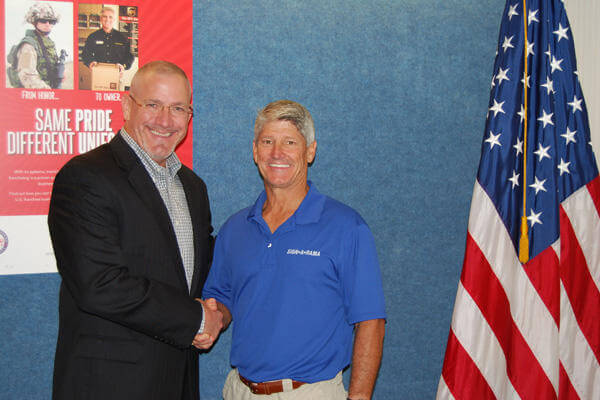Military.com recently interviewed Robert "Buzzsaw" DeGroff, a franchisee with Signarama. DeGroff, a veteran with years of experience with the 5th Special Forces Group (Airborne), took it upon himself to run a branch of the sign-making company once he transitioned out of the military. His story serves as an example of how veterans can leverage the skills they learned as service members to achieve success in the civilian world.
Military.com: How did your time in the military help prepare you for a civilian career?
Robert DeGroff: "The most important aspect of service that prepared me for a civilian career was knowing how to lead people. As I earned higher ranks, I received more responsibility and learned how to manage people, but more importantly how to motivate them.
"Anyone can start a business, but the hard part is to be successful at it. Although there are different measures of success, building a team of employees that share in your vision, goals and objectives will assist in your success.
"Being able to multitask at a high level will equip you for the many facets of managing a business. Developing your subordinates, again, is critical to building the team, because that team is the critical piece.
"Identifying short-, medium- and long-range goals as a soldier helped me develop a business plan and the plan of action for my business. I learned that if everything is a priority, then nothing is a priority.
"Execution of the plan is where my military training really helped me, because, always and forever, the situation will change which requires a change in the plan. Whether due to resources, weather or Murphy's law, you will constantly be troubleshooting at the tactical level and fragging the plan to form a new one."
MC: What were your goals when transitioning out, and how did you plan to accomplish them?
RD: "My goals were to find a placeholder position in the civilian community, get settled back into Fayetteville, N.C., then start my own business. I had to prepare myself financially before taking the plunge. Most importantly, I had to identify which franchise was the best fit for my strengths and weaknesses.
"It was a five-year plan, but because I was a civilian and no longer had influence, I experienced a lack of passion and didn't quite make it a year. I was a business owner within 10 months of retirement. I accomplished that by being financially prepared, making a plan and then executing it."
MC: How did you learn about and use the VetFran program?
RD: "The VetFran program was not in existence when I joined Signarama, but I chose them based on their business model and the integrity of the organization. Their concept of helping a franchisee build their business is based on systems they developed over 25 years.
"They assist instead of micromanage. They provided me with the tools to be successful, but didn't insist on the color of the hat I had to wear. I had the freedom to express and explore. I was actually retroactively enrolled in the program, because Signarama wanted me to benefit from the program and felt bad that the concept had not come to fruition until after I became a franchisee.
"They asked me to assist in the program in raising awareness and paid me back a portion of my franchise fee as a way of saying thank you. That speaks volumes about the kind of organization I am a part of."
MC: What were some challenges associated with becoming a franchisee of Signarama?
RD: "Civilians were my biggest challenge -- civilian employees, to be more precise. It took me awhile to identify the quality of people that I needed to surround myself with. Therefore, that became the focus or priority, if you will.
"The systems are not hard to follow, but learning the business of signs was extremely hard. It took me awhile to learn the plethora of types of signage and the application process to turn an idea into a sign that the customer is proud of."
MC: Can you take us through a typical day of running your business?
RD: "A typical day starts out at around 0600 with physical fitness training; some things will never change. I'm at the office by 0830 for the morning meeting. We go over the jobs we're working to ensure that customers are receiving their proofs of future signs.
"We also ensure that we have the resources to make the signs and run the business. Afterward, I mentor my sales team and make sure that they are staying on task and assisting where possible to help them be more successful. Then it's my turn to go out to potential customers and sell our products.
"In the afternoon, I assist with production or installation of signage and prepare quotes for customers. Lastly, I run quality-control checks on products that have been completed and, most importantly, encourage and praise the team on the day's events before they leave.
"By about 1730, I wrap up any paperwork and bill paying that needs to be completed before going home. Somewhere in that day, I go home for lunch and lay my head back for a few minutes to clear my head so that the afternoon will be as productive as the morning."
MC: What advice would you give to veterans who are interested in becoming a franchisee?
RD: "Be financially prepared. Banks aren't lending money to people that need it, only to those that don't need it. Get your business plan together and do your own due diligence. Don't just talk to other successful owners in your business, but the ones who are not doing well, too.
"Listen to both. Typically, the ones that are suffering are the ones who stray away from the system and go too far right or left on what they thought was a good idea. Use your coach like a tank of gas; he is there to assist, so use him. Lastly, remember just like when you were in the service, failure is not an option."
MC: If you had to give a transitioning service member one piece of advice, what would it be?
RD: "No matter what your job was in the service, be grateful you survived it. After being a nation at war for the last 12 years, everyone who participated in the fighting did so at a great cost to their health and their families.
"Not being shot at for over two years, for me, is a good thing. Embrace the new challenges that the transition will bring. No one will be coming to your front door begging you to work for them with a six-figure income unless they're planning to throw you right back in the fire overseas. Retirement checks don't start when you need them to, and if you are due disability, it, too, will not come right away.
"Embrace it all and enjoy it. If you want to seek employment working for someone else, so be it. However, if you are up to another challenge, start your own business. For me and the current state of the economy, a sign company franchise was a great fit.
"I was a soldier for over 28 years, and I served with pride and passion for who I was and what I did. I am now just 'Buzzsaw' DeGroff, the sign guy. And I have just as much pride and passion as I did in the military."
Find the Right Veteran Job
Whether you want to polish your resume, find veteran job fairs in your area or connect with employers looking to hire veterans, Military.com can help. Subscribe to Military.com to have job postings, guides and advice, and more delivered directly to your inbox.











